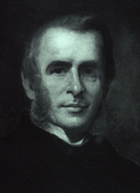 |
 |

The Idea of a Great Park
As far back as the early 1850s, newspaper editorials, letters to the editor, and testimony before legislative committees offered various accounts of the origin of Central Park, and many shared a common theme: they attributed the idea to an anonymous "gentleman" who, some said, had recently returned from Europe with the vision of a great park. [Ch12]
 All evidence points to the merchant prince Robert Bowne Minturn -- a man eulogized at his death as the "American gentleman." In May 1848, so said a privately published Memoir by his son, an overworked Minturn and his family headed for an eighteen-month grand tour of England, France, Italy, Switzerland, Germany, Jerusalem, and Egypt. In the winter of their return, 1849-1850, "conversation often turned upon the difference between our own country and city, and those abroad; and the remark was made that there was no want of our city so great as a large park for walking and driving." At an evening gathering at the Bowling Green mansion of the banker Robert Ray, "a decision was made at once to call a meeting of gentlemen to discuss the idea." They convened at Minturn's downtown home and decided not only on a park but on "a large and beautiful grove on the East River" known as Jones Wood, as the appropriate site; whereupon "legislative action [was] taken to secure it." [Ch13] All evidence points to the merchant prince Robert Bowne Minturn -- a man eulogized at his death as the "American gentleman." In May 1848, so said a privately published Memoir by his son, an overworked Minturn and his family headed for an eighteen-month grand tour of England, France, Italy, Switzerland, Germany, Jerusalem, and Egypt. In the winter of their return, 1849-1850, "conversation often turned upon the difference between our own country and city, and those abroad; and the remark was made that there was no want of our city so great as a large park for walking and driving." At an evening gathering at the Bowling Green mansion of the banker Robert Ray, "a decision was made at once to call a meeting of gentlemen to discuss the idea." They convened at Minturn's downtown home and decided not only on a park but on "a large and beautiful grove on the East River" known as Jones Wood, as the appropriate site; whereupon "legislative action [was] taken to secure it." [Ch13]
"The remark was made" -- that passive voice in the memoir obscures the identity of the speaker of the crucial remark. It appears, in fact, that the anonymous person was no gentleman at all, but a gentlewoman. A sketch of the Minturn family published in 1897, based on information supplied by Minturn's grandson, describes the "high intelligence and personal charm" of Minturn's wife Anna Mary Wendell and declares that "the agitation for establishing Central Park was initiated by her, and carried to success by her husband and the friends whose interest in the plan she had aroused and inspired." [Ch14]
Central Park emerged out of a complex mix of motivations -- to make money, to display the city's cultivation, to lift up the poor, to refine the rich, to advance commercial interests, to retard commercial development, to improve public health, to curry political favor, to provide jobs. No single individual either conceived or carried through the massive public project that, in the end, cost more than $10 million (three times the city's total budget in 1850) and took more than eight hundred acres out of the most expensive and intensely competitive real estate market in the United States. [Ch18]
BACK | NEXT
 |
 |
 |
 All evidence points to the merchant prince Robert Bowne Minturn -- a man eulogized at his death as the "American gentleman." In May 1848, so said a privately published Memoir by his son, an overworked Minturn and his family headed for an eighteen-month grand tour of England, France, Italy, Switzerland, Germany, Jerusalem, and Egypt. In the winter of their return, 1849-1850, "conversation often turned upon the difference between our own country and city, and those abroad; and the remark was made that there was no want of our city so great as a large park for walking and driving." At an evening gathering at the Bowling Green mansion of the banker Robert Ray, "a decision was made at once to call a meeting of gentlemen to discuss the idea." They convened at Minturn's downtown home and decided not only on a park but on "a large and beautiful grove on the East River" known as Jones Wood, as the appropriate site; whereupon "legislative action [was] taken to secure it." [Ch13]
All evidence points to the merchant prince Robert Bowne Minturn -- a man eulogized at his death as the "American gentleman." In May 1848, so said a privately published Memoir by his son, an overworked Minturn and his family headed for an eighteen-month grand tour of England, France, Italy, Switzerland, Germany, Jerusalem, and Egypt. In the winter of their return, 1849-1850, "conversation often turned upon the difference between our own country and city, and those abroad; and the remark was made that there was no want of our city so great as a large park for walking and driving." At an evening gathering at the Bowling Green mansion of the banker Robert Ray, "a decision was made at once to call a meeting of gentlemen to discuss the idea." They convened at Minturn's downtown home and decided not only on a park but on "a large and beautiful grove on the East River" known as Jones Wood, as the appropriate site; whereupon "legislative action [was] taken to secure it." [Ch13]